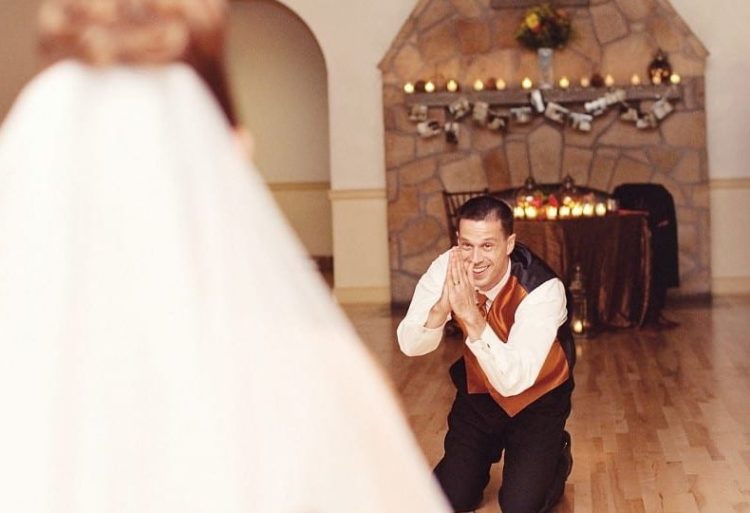
We have some good news and some (potentially) bad news. The good news is, you have found the love of your life. The bad news is, she has a family, and so do you. Why is this bad news? Because it means both your parents and her parents are about to gain a new set of in-laws.
Gorshank’s Law (a thing we just totally made-up) states that there is a 41% chance (a percentage we just picked at random) that any two sets of in-laws will end up like the Hatfields and McCoys, the Lannisters and the Starks, Bugs Bunny and Daffy Duck. They will, to put it politely, “not get along.”
There are a number of fault lines that can separate in-laws and cause them to hate each other: it could be wealth, religion, Fox News vs CNN, Drake vs. Meek Mill. For whatever reason, parents of the bride and groom often end up acting like kids in a sandbox. The wedding only heightens these tensions, as it is a deeply emotional thing for both sets of parents, each of whom have their own styles and expectations.
Your mission, should you accept it or not, is to reduce anxiety, resolve conflicts, and avoid a war breaking out in the middle of your vows. Here are some tips:
Divide and Conquer
Remember the British Empire, and how a small soggy island managed to dominate three quarters of the globe? Take a few moves from their playbook. You and your bride should talk to your parents separately and deliver the same message. Say something like, “Mom and Dad, you know I love you guys so much. And I really don’t like my in-laws. They truly suck. But I’m not marrying them. I’m marrying their daughter (who also thinks they suck). Look, we’re all on the same team here. None of us wants any drama at the wedding. So just for this one day, it would mean a lot to me if we could pretend to bury the hatchet. And once the wedding is over, I promise we can all go for a drive to their house and leave a burning paper bag of dog poo on their doorstep. We’ll do it together. It will be fun.” Because both sets of parents now feel supported in their hatred and believe their child is “on their side,” they may be able to contain the urge to have a brawl during the cocktail reception.
Be Open to Other Viewpoints
One reason for conflict between in-laws is simply because we humans are afraid of what is different. Let’s say you are having an interfaith marriage. Perhaps your family is Amish and your bride’s family are Satanists. Listen and learn. Being open to finding out who these people are and what is important to them will help you to develop a respectful understanding of why they insist on drawing pentagrams all over the floor.
Share who you are, too. Talk about why you want to drive a horse and buggy and have a long beard and think building a barn is fun. Before you know it, you will develop your own relationship with your in-laws, separate from the one your fiancé has with them, and you will be spending less time making wooden furniture and more time summoning the demon prince Azazel from the fiery depths of his hellish kingdom beneath the earth.
Pretend to Listen
Sometimes, when other people talk about their beliefs, you will think to yourself “My God, these people are idiots.” You may even be tempted to point this out. But if they are your in-laws and your wedding is a few weeks away, this will only lead to animus. Take the high road and realize you can’t change them–and make sure your parents take the high road, too. Tell them to just smile and nod their heads when their new relatives criticize the decorations, or complain about the food, or start giving their opinion on the Israel/Palestine conflict.
Form an Unbreakable Alliance with Your Bride
Even more important than avoiding friction between your respective families, is making sure you and your fiancée don’t wind up getting into a fight over any inter-familial issues. You and she should have a planning meeting where you talk through the most likely friction points, and find ways to de-escalate conflicts between your families before they break out. This is a wonderful exercise to bring you even closer. Once you have figured out a plan, then sit down with your in-laws as a couple and find out what is really important to them. The key is to identify areas of commonality, and see how you can incorporate their wishes into your wedding. Emphasize compromise and politeness. Don’t let your parents pit you against your fiancée.
Be Sensitive to Conflicting Loyalties
Remember that your fiancée has been a daughter her entire life. Her relationship with you is newer, and the wedding marks a transition from being a daughter to being a wife. This is not always an easy shift, and will raise issues of conflicting loyalties. As much as she may complain about her parents, you should be empathic but never join in. Only she has the right to call her mother a lunatic. No matter how obvious it may be that you agree, never say so, because that lunatic is your future mother-in-law and she will find a way to get back at you.
Don’t Turn In-laws into Outlaws
Remember that every family is different. Some are warm and intimately connected, and others are cold and aloof. Try not to take it personally if your two sets of in-laws interact like a cat thrown into a bathtub. There’s not always a “right and wrong” way to relate as a family–everyone has their own language, reference points, and histories. If your fiancee’s family appear to be a bunch of savage barbarians with uncouth habits and no discernible sense of morality, try to remember that some of your family’s habits may also seem odd to them.
Every family has dysfunction, and it is rare that two rumbling balls of neurosis roll smoothly together. So be patient. Listen more than you speak. And bring a fire extinguisher.
















